Wuyi Rock teas: Native farmer, exclusive producer and organic tea factory
Wuyishan, 12th May 2016
After the sweet-sour Phoenix single bush is time for the bold Wuyi Rock teas. We travel from the Guangdong province to the north of Fujian and prepare our minds and mouths to a completely new taste, that of the baked Yan Cha, the tea from the cliffs.
The popularity of Wuyi Rock Tea grew very much in the past eight years. To get a better understanding of this tea and its sale channels we –I’m still travelling with Dora and Balasz from Teavolution– have selected three different suppliers. A lady born and raised in a Wuyishan village; her family owns tea fields and has been producing Yan Cha for generations; A rare organic tea factory, with organic certification for Chinese, Japanese, American and European markets; and an exclusive tea producer who buys the fresh leaves from the best cliffs to turn them in extraordinary Rock teas.
Our visit starts with a spicy lunch on a wooded terrace, surrounded by nature. Then we move to the lady’s tea shop for a first dose of Yan Cha. Cup after cup, gaiwan after gaiwan, the restless shy lady shows us a range of different tastes; some teas are floral and light, other are round and mineral, some more extremely baked and heavy. The baked ones saturate our taste buds. We need a Yan Cha break.

Lunch on a wooded terrace surrounded by nature.
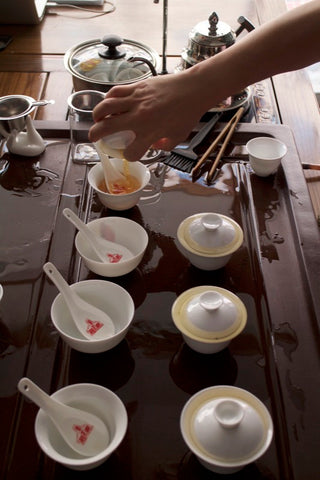

After many Rock Teas our taste buds are saturated.
Beside Rock tea, Wuyishan is also famous for outstanding black teas. Before driving to the tea fields on the mountain we try four of them. Three are produced with leaves from the Wuyi mountains, one comes from Tongmuguan, a famous black tea city two hours drive from here, whose access is prohibited to foreigners. All of them are first spring teas from this year. The dry leaves are black, with few golden tips. Infused, their color changes into a dark-green hue, sign of a short oxidation; these black teas are less black than usual. The liquor is also very pale, rather yellow than red. Two teas stand out for their rich aroma. One is unusually floral, the other one reminds me of lemon’s skin, refreshing! A good choice to neutralized the charcoal taste from the Yan Cha.

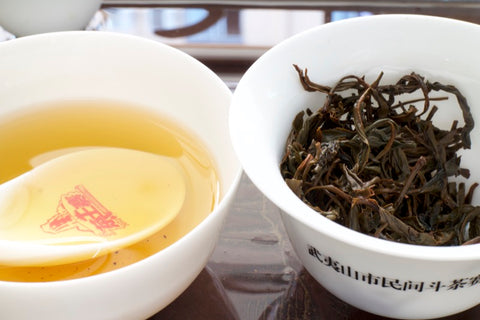
First spring black tea. The dark-green color of the steeped leaves and the bright liquor reveal a short oxidation, common among aromatic, first spring black teas.
After the long tea tasting we go to the tea fields. We drive up to an unpaved road, challenging the lady’s SUV; her husband drives. At sunset we reach Dashuikeng, a tiny village on top of a mountain. Opposite to us, on the other side of the Nine-bend River, there is the Wuyishan protected area, with its famous, huge, dark-red cliffs. At our arrival the uncle of the lady is collecting the withered leaves from the floor of his small factory; few minutes later he puts the leaves in large cylindrical drum in which, over night, the oxidation will take place. Today is the last day of harvest for this season.
Dashuikeng is surrounded by tea gardens. Before it gets too dark we go for a walk through tea bushes and trees. Some plants are very old, like those in the semi-wild Shui Xian Lao Cong garden shown in the picture below (Lao Cong means Old Bush, , i.e. from tea trees of great age). After dinner we drive back to the hotel. 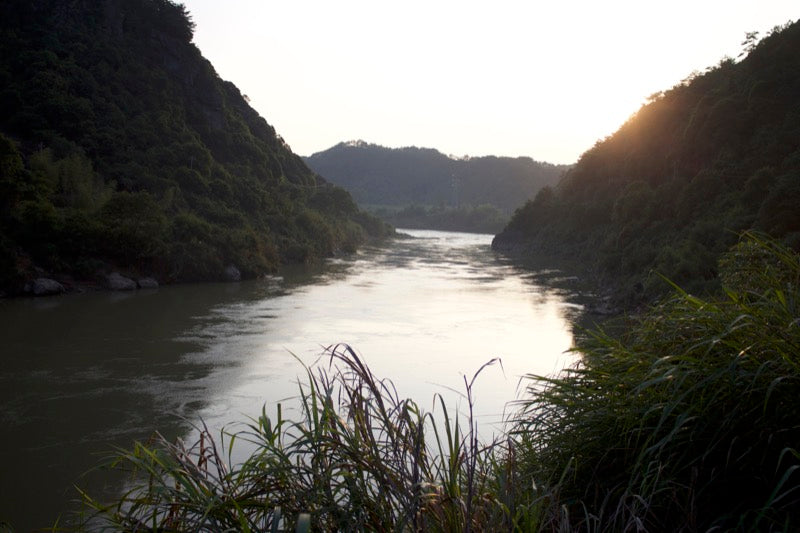
The Nine Bend River, crossed before driving up the mountain.

Tea farmer at rest in Dashuikeng.
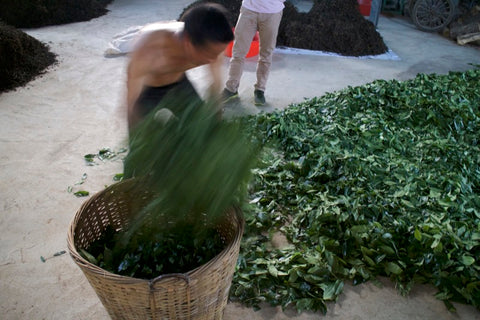
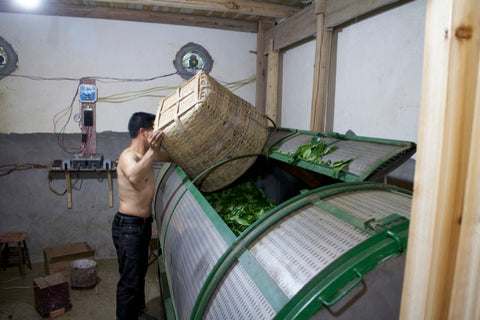
Collecting the leaves after withering (left) to put them in the drum for overnight oxidation (right).
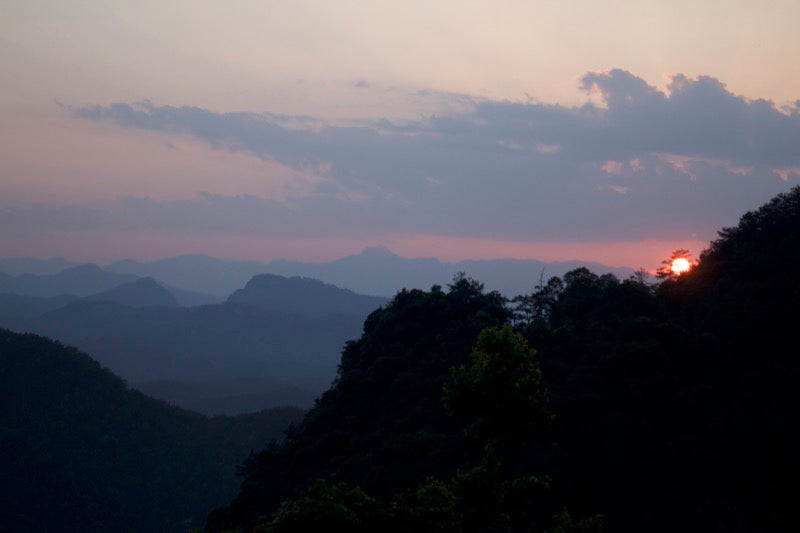
View at sunset from Dashuikeng.
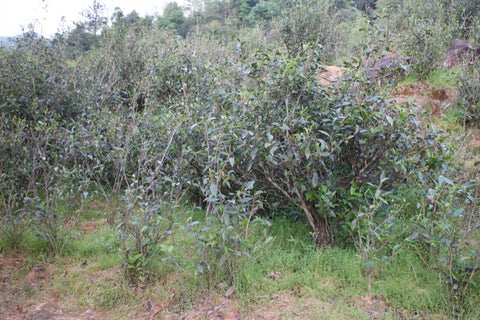
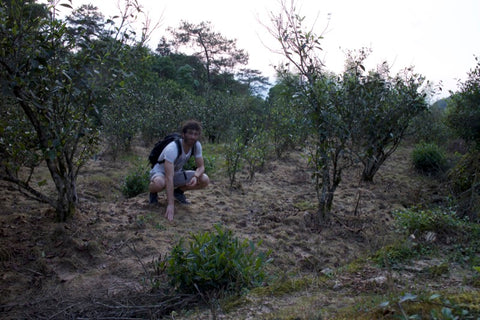
Shui Xian Lao Cong, a garden of old Shui Xian tea plants. Note the grass under the shrubs and other plants surrounding them: a wild and natural tea garden!

Delicious dinner in the farmer’s house.
Wuyishan, 13th May 2016
In the morning we visit an organic tea farm, a couple of kilometers out of the protected area. As often the case, I found this place by pure chance. Last January I was dining out with some tea friends in Shanghai, with us there was a man producing Yan Cha in Wuyishan. My friends are “tea aristocrats” and tend to surround them with persons of their kind, producing or selling tea of best quality. In spring I contacted again the Yan Cha producer asking if he was aware of any organic tea production in Wuyishan. He is a local and we were introduced by one of his best customers; so I knew he would do its best to satisfy my wish; and so it was!
I was not aware of organic production in Wuyishan and certainly was not expecting one so close to the protected area!
The factory is on the countryside, in the center of the tea field. They use lamps to attract the insects, thus limiting the bites on the leaves; an alternative to pesticides.
We try a few teas, focusing again in the difference between light and strong baking. Baking is an art and can ruin as well as arise the quality of the tea. Factory usually have backing expert or rely on external persons, specialized in baking.
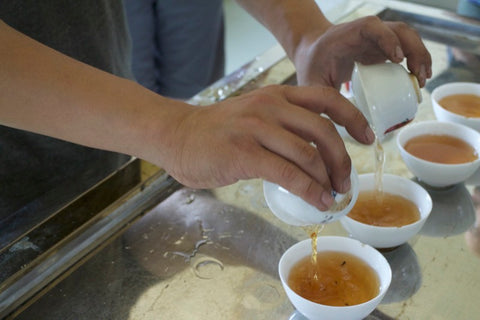
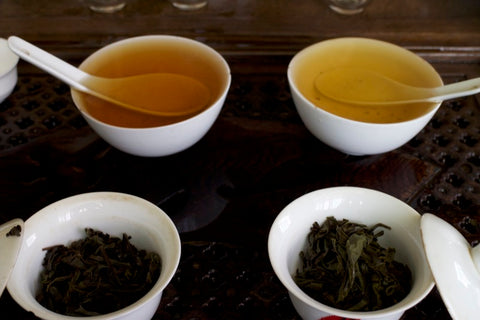
Tasting short and long baked Wuyi Yan Cha in an organic tea farm.
Some of the teas we would like to try are not available . They will re-bake them in the night to further dry the leaves and bring as samples tomorrow for tasting.
At lunch we go to another restaurant hidden in the nature. Again super-spicy food. Now I can better understand why the locals like the heavily baked Yan Cha. The floral one would not fit at all to their culinary habits! 
Wuyishan food is well-known in China for being very spicy, like this fish floating in a chili pepper sauce.
After lunch we visit the leaves processing room. After withering, the leaves are slowly oxidized for several hours before been rolled and heated up; the first heating is short and high-temperature to stop the oxidation process; the leaves are further heated in a drying machine until they are ready for baking. Baking is performed a few times (one to four) over a period of several months. After each backing the leaves shall rest for weeks until they can be baked again. Each backing can be done at different temperature (approx. 50-90°C – my estimation) and for different duration (5 to 15 hours). Backing can be done on charcoal ashes –the traditional and most demanding method- or using electrical backing basket. All Nannuoshan’s Rock teas are backed on Charcoal.
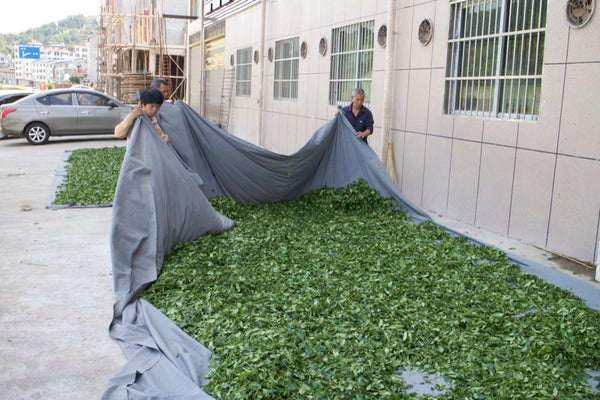
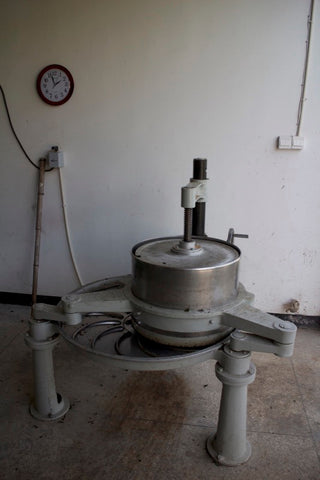


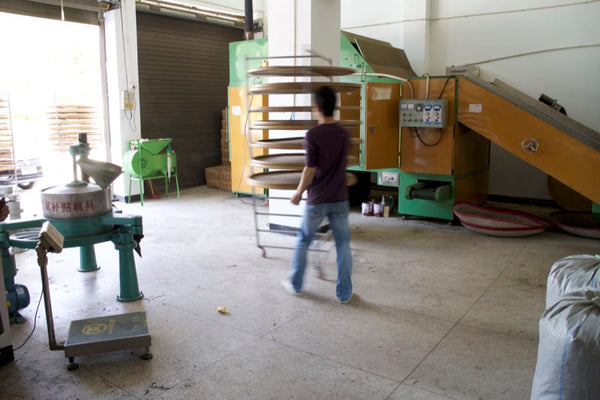
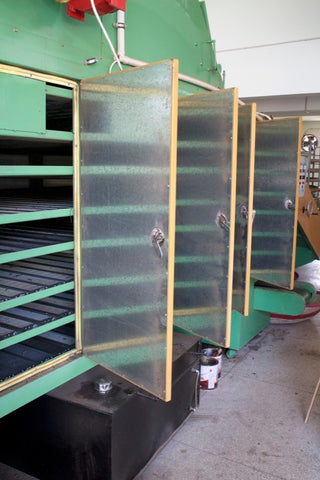
Some machines used for processing the fresh tea leaves. Leaves collected after outdoor withering (top left), rolling machine (top right), Heating oven to stop oxidation (middle), drying machine bottom.

Workers having a brake and discussing about the unusual foreigner guests. In the background, tons of tea stored in bags, waiting to be baked.
After a short rest in the hotel we are all ready for the next tasting. The best producers are the most difficult to discover. They rarely show off on main roads, for their production is small and exclusive. They don’t need to attract customers, but rather select the few that can access their limited production. The tea house we visit is on the first floor of a rather basic building located in a tiny side road. Outside there is no sign that indicate the treasure hidden inside. Two years ago, last time I visited them, their tea house was already a gem. Last year they have completely changed the interior furniture and design. Three separated three tasting room and a huge wooded terrace. Each room decorated in a different style, including a Japanese-like tearoom, with low table, and sliding doors. Many small and big artifacts decorate every corner, without excess. We sit at a massive wood table and start drinking tea served from crystal clear pitchers with classic music in the background.
The ambience is so calm, muffled. The host, a couple in their middle thirties, are relaxed and slow-motion. We drink tea without spending many words to not disturb the atmosphere.
The tea liquors are extremely clear; they don’t use any filter but it’s hard to spot any trace of impurity in the glass. The taste goes along with the appearance.

After many gaiwans we are not yet tired of Yan Cha. Even the most heavily baked tea, a Da Hong Pao baked for 30 hours, is very smooth and round. Strong, very strong for sure. But nonetheless pleasant. I think it is the first time that I fully appreciate a heavily backed Yan Cha.

Replacing the host at the gongfu cha table.
Most of the teas we are drinking are extremely expensive. We are served Wuyi Yan Cha that cost 1800 € for 500g and later in the evening divine black tea worth 500 € / 500g. These are Chinese wholesale prices! You can imagine which would be the retail price in Europe, after shipment cost, customs duties, VAT and seller margin. There is no market for these teas in Europe, but enough crazy and rich people in China able and willing to spend these crazy sums.
Luckily, some of the teas are just about affordable; actually not really so; but I convince myself they are. So I buy 500g of a few of them –the minimum quantity for getting wholesale price. A few connoisseurs among our customers will for sure be happy to taste them; and I also want to show Michela the difference between good and better Yan Cha.
Wuyishan, 14th May 2016
Whole Dora and Balasz are in town to complete some orders my translator and I go back to the couple’s tea house to collect the tea ordered yesterday. Today we are served a specialty. A finely smoked Zhen Shan Xiao Zhong from Tongmuguan (authenic Lapsang Souchong) in espresso-size glass cups mixed with two jams: Osmanthus petals and kumquat peel. The sweet of the petals and the sour kumquat peel perfectly harmonize with the subtle smokiness. A delight that you may try in our tea house!

Finely smoked black tea mixed with osmanthus petals and kumquat peel jam. Now available also in our tea house in Berlin.
For Nannuoshan I buy tea from all three suppliers ranging from a floral Huang Mei Gui (Yellow rose) to a balanced Da Hong Pao (pure Qi Dan leaves!) and an intense organic Rougui.
After the 14th of May till today (22nd May)
I spend the last days in Shanghai, packing all items purchased in the last weeks. Half a ton of tea and teaware that soon will be sent to Berlin.





